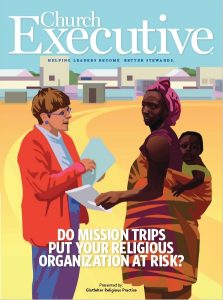
Expert advice for protecting your members, staff and volunteers while they’re abroad

Director,
Risk Control Services
Glatfelter Religious Practice
How common is it for church groups to encounter avoidable risks and safety issues while on mission trips abroad?
Betty Norman: If there’s good planning and preparation that goes into each mission trip, avoidable or predictable risks should be limited.
It’s recommended that there be a committee in place to evaluate mission opportunities and plan ahead.
Some church communities do several mission trips a year, while others might only plan trips on an occasional basis.
In any scenario, the more time put into preparation, the less chance of problems.
Is there anything about church-based mission trips, in particular, that carries a higher-than-normal amount of risk?
Norman: For trips within the continental U.S., the biggest risk is often transportation. Will travel be done in personal vehicles, or a church-owned van? Will a third-party transportation company be used? Verification of a clean motor vehicle record and evidence of a current driver’s license is important. For extended road trips, is there time built in for the driver to rest, or are drivers exchanged? For trips to other countries, attention should be paid to State Department Travel Advisories. This resource will detail any important information, as conditions in foreign countries can change rapidly. It assigns precaution levels and notes when the most recent advisory updates have been made.
From a risk management perspective, what are the most overlooked areas of risk for a church mission trip?
Norman: Transportation, as stated above, as well as plans for how to handle a medical or other emergency. It’s important to be well-informed of political and cultural differences, as well as laws.
Are there risk management benefits to booking through a tour operator versus “going it alone”?
Norman: Using a third-party tour company allows the organization to ‘share the risk’ and might also help with better management of an emergency, should one occur. These companies typically have contacts within the countries they plan to travel to, as well as extensive experience traveling in those areas, which could be greatly beneficial.
Is a travel policy something you’d recommend for churches planning mission trips?
Norman: Yes, I’d recommend a travel policy — particularly for trips that are outside of the U.S. These policies can include coverage that helps provide necessary protections in critical situations, like in the case of medical or emergency expenses, should they arise.
What are the critical elements of a sound travel policy?
Norman: Most travel policies will cover items such as medical expense benefits, emergency medical expenses, emergency medical evacuation, and repatriation — the return of someone to their own country.
What types of emergency procedures should a church map out in advance?

Norman: It’s important to develop an emergency preparedness plan for a number of potential emergencies, including natural disasters that impact travel; security or terrorism emergencies at the mission location (recently an issue for some missionaries in Haiti); medical emergencies; missing participants; and communication failures, such as lack of phone or internet service.
All mission trip participants should sign a waiver and have training on these emergency procedures prior to the trip.
Who should be selected, generally, to lead mission trips abroad? Should they undergo special vetting?
Norman: Ideally, the leader of a mission trip should have significant experience in mission work and travel. For larger mission trips, there might be an identified mission leadership team. For mission trips that involve a number of underage, minor children / teenagers, there should be identified chaperone ratios. All adults should have criminal background and abuse registry checks.
Similarly, are there any special considerations for who might not be suited, as a traveler, for a foreign mission trip?
Norman: The most important consideration might be based on the location of the mission. Certain countries might require special immunizations, making it more difficult for a traveler with existing health issues, whereas travel within the U.S. might not be a problem.
What technology tools should a church employ to help ensure mission trip safety?
Norman: Certainly a variety of communication tools and methods should be considered in advance of the trip. Certain mission locations might not have cell phone or internet access at all, making the mission participants isolated in the event of an emergency. If there is internet access, the church might be able to allow more congregation participation in the mission experience through a live streaming app, such as Skype.
What types of mission trip coverage are available to churches, and what do those plans look like / entail?
Norman: As mentioned earlier, mission trip coverages typically include medical expense benefits, emergency medical expenses, emergency medical evacuation, and repatriation.
What resources can you provide a church, from a provider’s perspective, to help ensure a safe mission trip experience?
Norman: We have a mission travel accident package available through our Glatfelter Religious Program and Glatfelter Specialty Benefits divisions.
— Reporting by RaeAnn Slaybaugh


